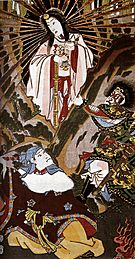Susanoo facts for kids
Quick facts for kids Susanoo-no-Mikoto |
|
|---|---|
| God of the sea and storms | |

Susanoo slaying the Yamata no Orochi, by Utagawa Kuniyoshi
|
|
| Other names | Takehaya-Susanoo-no-Mikoto (建速須佐之男命) Haya-Susanoo-no-Mikoto (速須佐之男命, 速素戔嗚尊) Take-Susanoo-no-Mikoto (武素戔嗚尊) Kamu-Susanoo-no-Mikoto (速素戔嗚尊, 神須佐能袁命) Kushimikenu-no-Mikoto (櫛御気野命) |
| Japanese | 須佐之男命, 素戔嗚尊, 素盞嗚尊, 須佐乃袁尊, 須佐能乎命 |
| Major cult center | Susa Shrine, Yaegaki Shrine, Suga Shrine, Kumano Taisha, Susanoo Shrine, Hikawa Shrine, Yasaka Shrine, Hiromine Shrine, Tsushima Shrine |
| Texts | Kojiki, Nihon Shoki, Izumo Fudoki, Sendai Kuji Hongi |
| Personal information | |
| Consort | Kushinadahime, Kamu-Ōichihime, Samirahime |
| Children | Munakata goddesses, Ōtoshi, Ukanomitama and others |
| Parents | Izanagi (Kojiki) Izanagi and Izanami (Nihon Shoki) |
| Siblings | Amaterasu, Tsukuyomi and others |
Susanoo (pronounced Soo-sah-noh-oh) is an important god in Shinto, the traditional religion of Japan. He is known as the god of the sea and storms. His full name is Susanoo-no-Mikoto, which means "Great Male God Susanoo."
Susanoo is the brother of two other major gods: Amaterasu, the goddess of the sun, and Tsukuyomi, the god of the moon. All three were born from the god Izanagi. Izanagi created them when he washed his face after visiting the underworld. Amaterasu came from his left eye, Tsukuyomi from his right eye, and Susanoo from his nose.
Contents
Susanoo's Troubles in Heaven
Susanoo often had disagreements with his sister, Amaterasu. One time, Izanagi told Susanoo he had to leave Heaven. Before leaving, Susanoo wanted to say goodbye to Amaterasu.
The Challenge with Amaterasu
Amaterasu was suspicious of Susanoo. She suggested a challenge: they would each create new gods from an item belonging to the other. Amaterasu made three goddesses from Susanoo's sword. Susanoo then made five gods from Amaterasu's necklace.
Susanoo's Actions and Punishment
Amaterasu claimed the five gods were hers because they came from her necklace. Susanoo became very angry. He destroyed her rice fields and threw a dead pony into her weaving hall. He also accidentally caused the death of one of her helpers.
Because of Susanoo's actions, Amaterasu became sad, angry, and scared. She hid inside a heavenly rock cave called Ama-no-Iwato. When the sun goddess hid, the world became dark for a long time.
Later, Amaterasu was convinced to come out of the cave. As punishment for his behavior, Susanoo was banished from Heaven.
Susanoo's Journey to Earth
After being banished, Susanoo came down to a place on Earth called Izumo in Japan. There, he met an old couple who were very sad.
The Eight-Headed Serpent
The couple told Susanoo that a terrible eight-headed serpent called the Yamata-no-Orochi had eaten seven of their eight daughters. The monster was about to come for their last daughter, named Kushi-inada-hime.
Susanoo offered to help them. He said he would kill the Orochi if they promised him their daughter's hand in marriage. The couple agreed.
Defeating the Orochi
Susanoo came up with a clever plan. He prepared eight large bowls of sake (Japanese rice wine), one for each of the serpent's heads. When the Yamata-no-Orochi arrived, it drank all the sake and fell asleep. While the monster was sleeping, Susanoo bravely cut off all eight of its heads.
The Sacred Sword
From one of the Orochi's tails, Susanoo found a special sword. He named it Ame-no-Murakumo-no-Tsurugi, which means "Heaven's Cloud-Gathering Sword." This sword later became known as the Kusanagi-no-Tsurugi.
Susanoo gave this sword to Amaterasu as a gift to make up for his past actions. The Kusanagi sword later became one of the three Imperial Regalia of Japan. These are sacred treasures that show the right of the Japanese emperors to rule. The other two treasures are a mirror (Yata-no-Kagami) and sacred jewels (magatama).
Susanoo's Shrines
Amaterasu's main shrine is the famous Ise Shrine. Susanoo also has important shrines, especially in the Izumo region, where he landed after being banished from Heaven. Izumo is known for having some of the oldest shrines in Japan.
|
Mythic Texts and Folktales: |
Images for kids
See also
 In Spanish: Susanoo para niños
In Spanish: Susanoo para niños
 | John T. Biggers |
 | Thomas Blackshear |
 | Mark Bradford |
 | Beverly Buchanan |



